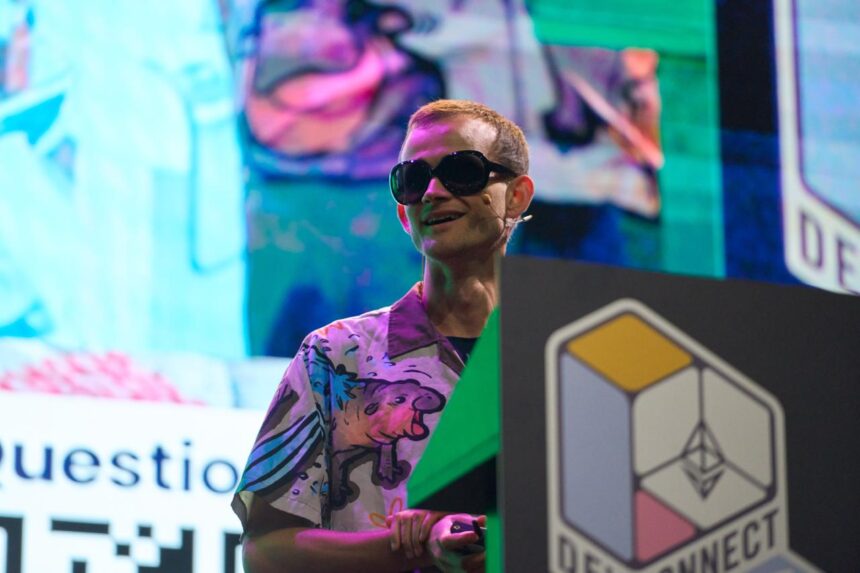Ethereum co-founder Vitalik Buterin appeared subdued and formal as he took to the main stage at Devconnect in Buenos Aires with a powerful message. The network is currently processing 50% more transactions than at the beginning of the year.
This was said in front of a room full of developers, entrepreneurs, and enthusiasts. CriptoNoticias attended the event and was able to witness first-hand how Buterin broke through technological advancements that redefined the future of the protocol.
From the beginning of his talk, the thinker tried to put the evolution of networks into perspective. Contrast with past mistakes in the ecosystem. He recalled the FTX and Mt.Gox debacles and explained why transparency and verifiability are essential.
“I think FTX is a perfect example of what can be done if you literally turn the principles of Ethereum 180 degrees,” he told the audience, emphasizing the value of decentralization as an antidote to trust violations.
For Ethereum’s co-founders, while the project’s network was designed to maximize trust through verifiable open systems, FTX operated as an unauditable structure, sustained by the blind faith of its users. “People deposited huge amounts of money, but there was no way to check whether FTX was solvent,” the developer said.
As such, crypto experts believe that this complete lack of transparency is exactly what opens the door to fraud, which will ultimately lead to One of the biggest ecosystem collapses in history.
According to the technologist, this reminder helps put into perspective why encryption and transparency are not technical details, but important guarantees to prevent errors from happening again.
Technical pillars driving Ethereum
Buterin used Devconnect to review Ethereum’s fundamentals as “the world’s computer, a censorship-resistant open global ecosystem,” and recalled that the network processes approximately 2 million transactions every day.
“The gas limit, a measure of the number of transactions that Ethereum can process, has already increased by 50% this year, so the network can now process 50% more transactions than at the beginning of the year,” he explained.
He also pointed out that A quarter of nodes vote to expand gas limit to 60 millionThis frees up even more space.
You can call it global, cosmopolitan, or other similar terms, but the idea is the same. Ethereum was born to make a real impact on the world. Next, let’s think of Ethereum as the “world’s computer.” An open, accessible, and censorship-resistant platform designed to enable anyone to build truly decentralized applications.
Vitalik Buterin, founder of Ethereum.
Simply put, the gas limit is an upper limit that defines the number of operations that Ethereum can process on each block. Each transaction consumes a certain amount of “gas”. It is a unit that measures the computational effort required to perform a transaction.
In addition to the current state of the network, Buterin devoted part of his talk to the advances planned for 2025 and 2026, particularly in terms of scalability and cost reduction for operating full nodes.
He explained that zero-knowledge proofs will allow more users to verify blocks without the need for expensive hardware, bringing the possibility of running lightweight nodes from common devices closer. “We will be able to bring the computing needs of the nodes to near zero,” he said.
Ethereum leader too Highlights important advances such as block hierarchical access lists. Essentially, instead of each node confirming every transaction for the entire block (which is time- and resource-intensive), it contains an organized list of accesses and state changes divided into sections or “tiers” based on the account or contract affected.
He then mentioned the Lean Ethereum project, which aims to simplify, secure, and thoroughly optimize the protocol for the next 10 years. Its objectives include increasing quantum resistance and the efficiency of consensus mechanisms.
Argentina’s role in the global ecosystem
The developers also dedicated part of their presentation to celebrating the growth of the local community and the role Argentina plays in technology adoption and experimentation in the region. he pointed it out Buenos Aires has established itself as one of the most active centers for programmers, entrepreneurs, and Web3 projects.driven by a culture that embraces innovation even in difficult economic times.
Ethereum’s co-founder says the country brings together a rare combination of technological talent, creativity and resilience, making it a “unique opportunity” for Latin America to establish itself as a global benchmark in decentralized infrastructure.
In his final message, the expert called on teams, companies and developers to prioritize interoperability and collaboration over commercial competition. “The value of Ethereum does not depend on a single project, but on thousands of projects building in the same direction,” he said, clarifying that: The future of the network will be sustained through open cooperation and joint efforts.
(Tag translation) Argentina


